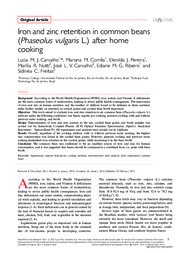Iron and zinc retention in common beans (Phaseolus vulgaris L.) after home cooking.
Iron and zinc retention in common beans (Phaseolus vulgaris L.) after home cooking.
Author(s): CARVALHO, L. M. J.; CORRÊA, M. M.; PEREIRA, E. J.; NUTTI, M. R.; CARVALHO, J. L. V.; RIBEIRO, E. M. G.; FREITAS, S. C.
Summary: Background: According to the World Health Organization (WHO), iron, iodine, and Vitamin A deficiencies are the most common forms of malnutrition, leading to severe public health consequences. The importance of iron and zinc in human nutrition and the number of children found to be deficient in these nutrients make further studies on retention in cooked grains and cooked bean broth important. Objectives: This work aimed to evaluate iron and zinc retention in six common bean (Phaseolus vulgaris L.) cultivars under the following conditions: raw beans, regular pot cooking, pressure cooking, with and without previous water soaking, and broth. Design: Determination of iron and zinc content in the raw, cooked bean grains and broth samples was carried out by Inductively Coupled Plasma (ICP) Optical Emission Spectrometry (Spectro Analytical Instrument Spectroflame P). All experiments and analyses were carried out in triplicate. Results: Overall, regardless of the cooking method, with or without previous water soaking, the highest zinc concentration was found in the cooked bean grains. However, pressure cooking and previous water soaking diminished iron retention in the cooked grains, while increasing it in the bean broth. Conclusion: The common bean was confirmed to be an excellent source of iron and zinc for human consumption, and it was suggested that beans should be consumed in a combined form, i.e. grain with bean broth.
Publication year: 2012
Types of publication: Journal article
Unit: Embrapa Food Technology
Observation
Some of Embrapa's publications are published as ePub files. To read them, use or download one of the following free software options to your computer or mobile device. Android: Google Play Books; IOS: iBooks; Windows and Linux: Calibre.
Access other publications
Access the Agricultural Research Database (BDPA) to consult Embrapa's full library collection and records.
Visit Embrapa Bookstore to purchase books and other publications sold by Embrapa.

